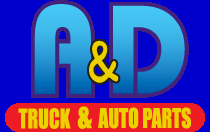New Parts
02/08/2014
I had a conversation with a friend today He swore he'd NEVER buy parts from X************ again. This is a national auto parts chain store. He was working on a '02 GM product that needed an axle. For some reason he decided (or maybe his customer did) on a "new" part. Not a used one. Within 20 miles of installation, the new axle snapped. It's not that the c-v joint snapped, but the actual steel shaft. After a $100 tow off the hi-way, things got a little heated.
What's the issue, this part was new? Can you say… China? Why do you think these new parts are so cheap? Of course I'm not only talking price here I'm talking quality. Inferior materials make for inferior parts. This is not to say that all new parts are inferior. But be very wary of new parts at recycled parts prices. I know of someone who installed a "new" hub on his pickup truck a short while back. It didn't last ten thousand miles. Quality used parts are OEM (original equipment manufacture), they were made for your car by the people who made your car! Save your money, and your time. Buy quality used parts!
Don't Be So Easily Intimidated!
11/15/2013
I had a friend call me last week perplexed on what to do with his wife's car. A 2002 Mazda 626. Seems they went to an automotive service center for something routine like an oil change. He was informed that one axle was torn, a sway bar link was broken and a transmission seal was leaking. This could all be easily remedied for just under $700! He was also informed that when they pulled the axle for replacement, all the transmission fluid would run out… YIKES!!
Not included in this "deal" was a much need flush & fill and that he should replace all his hoses. This could be done for around $300. Winter is coming you know. Now Henry (the names has been changed for privacy) was looking at about a GRAND ($1000) to do minor work on a 13 year old car. As he explained this to me, my first thought was, "are you nuts?"
Henry's a pretty intelligent guy, couple of college degrees to boot. But obviously easily intimidated! I explained to him that this is not a complicated job and the fact that he could save lots of CA$H, if he did it himself. I said if he's not that handy or motivated, that's what brother's in law are for! You should be able to get it all done for less than half of that $1000.
Let's break things down so to speak.
A good recycled axle: $35-$50
A new stabilizer link: $10-$15
Transmission seal – personally I'd inspect it before doing anything. My first question is it really leaking? Now if the seal is torn or cracked, YES replace it. But if it's not, leave it alone. You can always wipe a little brake fluid on it to keep it soft and pliable. Also think of it this way, if it's one drop every 3,000 miles you can always add a little fresh transmission fluid later.
New seal $15-$20
Now lets talk hoses. Are they "bulged", cracked or dry rotted? Also look for spots where they may have been rubbing on another component. Replace what's needed. The chance of needing them ALL is a long shot. You have a better chance winning tonight's PICK 4!
Lots of auto wreckers are now selling recycled antifreeze if you want to really go green or you can buy the new stuff. It's pretty easy to tell if it's broken down or not. If you're unsure, auto parts stores do sell testers.
Now I don't know how this repair shop was breaking down parts vs labor. But I will say one thing. I don't see $1,000 worth here. Don't be so easily intimidated!
Cash For Clunkers Uproar
1/28/2013
News articles have recently emerged that claimed the 2009 Car Allowance Rebate System (CARS) program, or Cash For Clunkers, did more to harm the environment than help it. The CARS program took nearly 700,000 “gas guzzling” vehicles off the road.
The articles, featured in The Environmental Magazine and Yahoo! News, claimed the Cash For Clunkers program added to environmental waste because many of those vehicles skipped auto recycling facilities and went straight to shredders instead, which created 500 pounds of residue per ton of metal shredded.
The articles also stated consumers took a hit because the lack of available, used vehicles drove up prices. You can read the full text of The Environmental Magazine article for more information.
These articles are just the latest in the discussions about the CARS or Cash For Clunkers program and whether it was worth it or not. The next issue of the Locator UpFront will look at how auto recyclers think the Cash For Clunkers program went and if it helped or hurt the industry.











